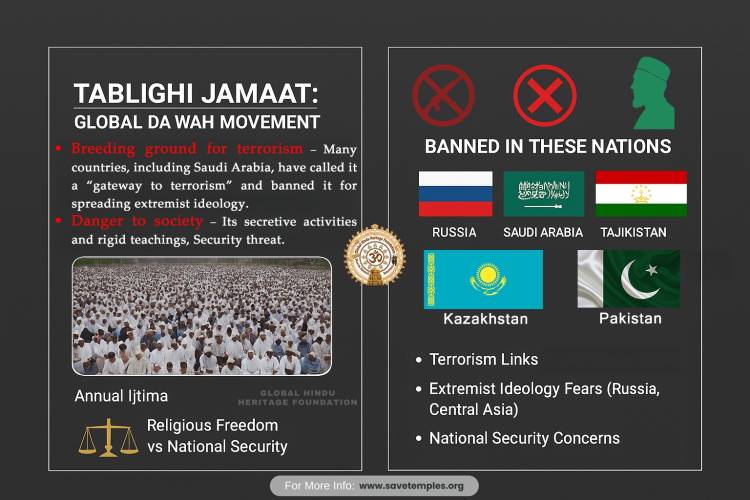What is Tablighi Jamaat? Why was it banned in Saudi Arabia and other countries?
 The Tablighi Jamaat (TJ) is a global Islamic missionary and revivalist movement focused on da’wah (preaching) and tabligh (spreading Islam). Founded to promote a return to core Islamic practices, its mission is to encourage Muslims to strengthen their relationship with Allah through consistent observance of prayer (salah), fasting, remembrance of God (dhikr), and outreach to others. It believes that societal reform begins with individual spiritual renewal and adherence to the teachings of the Prophet Muhammad.
The Tablighi Jamaat (TJ) is a global Islamic missionary and revivalist movement focused on da’wah (preaching) and tabligh (spreading Islam). Founded to promote a return to core Islamic practices, its mission is to encourage Muslims to strengthen their relationship with Allah through consistent observance of prayer (salah), fasting, remembrance of God (dhikr), and outreach to others. It believes that societal reform begins with individual spiritual renewal and adherence to the teachings of the Prophet Muhammad.
The group organizes massive annual gatherings known as Tablighi Ijtemas, which are among the world’s largest religious congregations, second only to the Hajj. These events feature sermons, collective prayers, and communal reflection, attracting millions, particularly in South Asia.
One such gathering planned in Sopore, Kashmir, was canceled due to security concerns. Similarly, a planned ijtema in Tirupati, Andhra Pradesh,
Sparked political opposition, with BJP leader T Raja Singh urging a ban, citing alleged terror links.
Over the years, Tablighi Jamaat has expanded dramatically and now claims over 400 million followers in 150 countries, with more than 20 million in Pakistan alone. Ironically, Saudi funding once supported this growth. However, its strict, puritanical teachings have come under scrutiny, with some law enforcement agencies linking its ideology to radicalization. Reports by the Pew Research Center and the United States Institute of Peace cite cases like the 2001 “Shoe Bomber” Richard Reid and John Walker Lindh, the American Taliban fighter, who were associated with Tablighi Jamaat circles.
Critics argue that while Tablighi Jamaat presents itself as apolitical, its gatherings can serve as breeding grounds for extremist ideas.
As a result, several countries have banned Tablighi Jamaat. Saudi Arabia declared it “one of the gates of terrorism,” directing Friday sermons to warn citizens about its dangers. Russia dismantled Tablighi Jamaat-affiliated terrorist cells and has banned the group since 2009, with the Supreme Court adding it to its list of monitored extremist organizations. Similarly, Iran, Uzbekistan, Tajikistan, and Kazakhstan have prohibited Tablighi Jamaat activities due to fears of extremist influence. In Pakistan, TJ has been banned from operating near universities to prevent radicalizing students.
Despite these bans, Tablighi Jamaat remains active in many Gulf countries, including the UAE, Qatar, Kuwait, Bahrain, and Oman, where local centers function openly. The movement’s rapid global growth continues to attract attention as governments grapple with balancing religious freedom against national security concerns.











 Urgent support needed for Bangladesh Hindus
Urgent support needed for Bangladesh Hindus 







